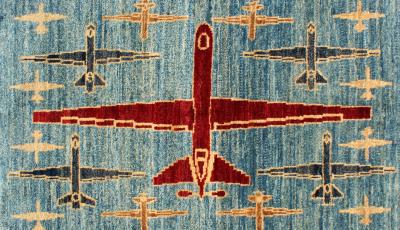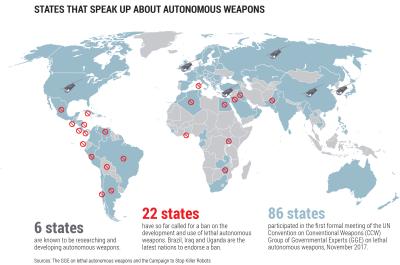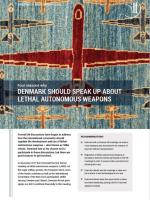Four reasons why Denmark should speak up about lethal autonomous weapons

■ Denmark will co-finance UN meetings on autonomous weapons and should avoid the scenario of payment without representation.
■ Regulation of lethal autonomous weapons is necessary. Denmark should participate in the UN meetings in order to prevent other countries from dictating the rules.
■ Denmark should use the meetings to raise concerns about a new technological arms race.
■ Denmark should seize this opportunity to show normative leadership, joining calls for improved weapons reviews.
Formal UN discussions have begun to address how the international community should regulate the development and use of lethal autonomous weapons – also known as ‘killer robots’. Denmark has so far chosen not to participate in these discussions, but there are good reasons to get involved.
In November 2017 the UN hosted the first formal meeting on lethal autonomous weapons (LAWS). All the major military powers, the European Union, most of the Nordic countries as well as the International Committee of the Red Cross participated. Unlike Norway, Sweden and Finland, Denmark did not participate, nor did it contribute financially to this meeting.
However, from 2018 onwards the UN will require that the Danish government provide financial support for the meetings on LAWS. Given this new obligation, it makes sense for Denmark to use its right to participate in these meetings. The scenario of payment without representation is undesirable and something Denmark should avoid. Besides this immediate concern, there are three other core reasons why Denmark should participate in the upcoming discussions this year. The UN meetings provide several opportunities for Denmark: first, to help establish the principles that should guide future warfare; second, to engage more actively in international efforts at arms control; and third, to show moral leadership in calling for improved weapons reviews.
Regulating future warfare
Regardless of whether Denmark will want to acquire autonomous weapons or not, the regulation of such weapons is necessary. Denmark should participate in the UN meetings in order to influence the discussions and prevent other countries from entirely dictating the rules on this matter.
The Danish military will eventually face autonomous weapons on the battlefield. Without clear international norms, states may feel little obligation to live up tohumanitarian imperatives.
Denmark’s closest allies are keen on developing and using autonomous weapons, while the Danish military has acquired high-tech aircraft able to interact with such weapons. The United States is leading the way, investing heavily in robotics, electronic warfare, artificial intelligence and autonomous technologies. Early last year US military airplanes released a swarm of small drones, which successfully completed a series of simple missions and returned to base without human intervention. Other great powers, including Russia and China, have also begun to develop autonomous weapons. Considering the technical capacities and strategic ambitions of Denmark’s closest allies, as well as its possible future adversaries, the Danish military will eventually face autonomous weapons on the battlefield. Without clear international norms, states may feel little obligation to live up to humanitarian imperatives.
Preventing a new arms race
The prevention of a new technological arms race between major military powers is another reason why Denmark should take an active interest in shaping the UN discussions. The great power pursuit of military advantages in the fields of computer science, communications, artificial intelligence and robotics could severely undermine strategic and political stability, increasing the risk of war. The UN meetings provide a formal platform for Denmark to flag concerns about military escalation, while seeking collective solutions.
Thus far, states largely deploy autonomous technologies in the strategic environments of air, land and, to a lesser degree, sea. Anticipating that LAWS will become an important part of dominating these domains, large military powers have begun to invest large sums in developing autonomous systems. The US Department of Defense has already earmarked $18 billion for research and development in this area for the period 2016–2020.
Such investments could intensify military competition while extending the arms race to other, still relatively uncluttered, environments. The weaponisation of outer space is a particularly urgent concern given LAWS’ reliance on satellites for navigation and communication. Over the past decade the US, China and Russia have all demonstrated an increasingly advanced capability in destroying satellites. At the same time, new breakthroughs in robotics and com-
puter science will make it easier for non-state actors and rogue regimes to weaponise such technologies.

Showing moral leadership
A final reason for Denmark to participate in the UN negotiations is that this forum offers an opportunity to exercise normative power: to help establish principles that will guide political and military action. Historically, small states like Denmark have exercised significant ‘soft power’ (defined by Joseph Nye as the ability to get others to want what you want) in bringing about normative change in international law and practice. Drawing on their administrative and diplomatic skills, as well as their reputation and image, the Nordic countries have ‘punched above their weight’, showing leadership on issues of equality, human rights, development, women’s rights, peace, humanitarianism and the environment.
Moral leadership will be crucial in moving
discussions on LAWS forward.
Moral leadership will be crucial in moving discussions on LAWS forward. In its recent meetings the UN fully confirmed that the international community cannot reduce the issues of autonomous weapon systems to legal and technical issues. Technical terms such as ‘machine learning’ and ‘machine intelligence’ often reflect a tendency to regard the difference between humans and machines as merely a matter of degree rather than of nature, leading towards the slippery slope of transferring human decision-making to machines. Small states like Belgium, the Netherlands and Switzerland have used the first formal meeting to spur reflection on the ethical principles concerning human decisions, dignity and agency in the development and deployment of autonomous weapons. Denmark, too, could seize this opportunity to show normative leadership, for example by joining calls for mandatory and more transparent reviews of weapon systems and their humanitarian impact.
The way ahead
Leading experts in the fields of robotics and artificial intelligence, prominently represented by Tesla’s Elon Musk, have referred to autonomous weapons as the third revolution in military affairs – following on from the inventions of gunpowder and nuclear weaponry. In a speech on 1 September 2017, Russian president Vladimir Putin concluded that the country that leads the way in artificial intelligence will also rule the world.

It is in Denmark’s interest to work actively against a further militarisation of international relations. The UN meetings on LAWS provide an occasion for doing so. There is already consensus on some basic issues. The use of autonomous weapons must be in accordance with international humanitarian law and must abide by human rights law. Any regulation of autonomous weapons must also try to avoid hampering progress in the peaceful development and application of autonomous technologies in the civil sphere, such as self-driving cars.
But much work remains. The ongoing formal discussions provide Denmark with an opportunity to share its views with the international community and work actively towards the development of simple and clear rules about which functions of weapon systems to delegate or not to delegate to machines. Here, Denmark could also join the calls for strengthening procedures for legal reviews of new and upgraded weapon systems to evaluate whether they meet standards required by international humanitarian and human rights laws. Sharing best practices would help ensure that countries use similar standards.
Limiting the production and stockpiling of autonomous weapons remains the best protection against these weapons, but the UN forum can make progress in developing regulations and norms that willstigmatise certain weapons deemed both politically dangerous and morally unacceptable by the international community.
DIIS Experts






